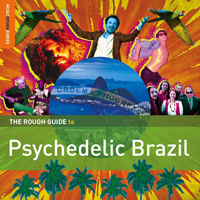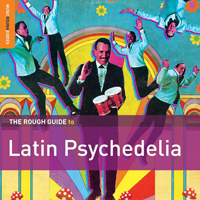
The Rough Guide to Latin Psychedelia & Los Destellos – The Rough Guide to Los Destellos (World Music Network, 2013)
The drug culture, drug wars, altered states and stoner rock: not exactly a modern picture of beaux arts. But rewinding past the unfortunate chaos of modern events and unfortunate associations with baser attitudes reveals a history of psychedelic music that was emblematic of freedom, liberation, spiritual enlightenment, and infinite possibility. At the intersection of imaginative musicianship, daring production, dreamy poetry, and libertine spirituality, psychedelia exemplified an ethos of experimentalism, free-wheeling independence, and intrepid expansion that defined the 1960s of Europe and the US. In Latin America, the advent of the Beatles, Santana, Jimi Hendrix and Pink Floyd coincided with both rapid urban development and violent dictatorial repression.
The music of out-of-body and out-of-mind experience took root in the musical practices of Latin America as a perpetual symbol of freedom, modernity, opposition, and liberation. The swirling studio experiments at the limits of sound, dense orchestrations and injection of exotic instrumentation took on new possibilities in the hands of musicians across the Americas. Unlike the US and Europe, these traits did not become passé and continued to spawn psychedelic, fusion, and prog-rock styles that still inhabit the main stream.
Two recent releases in prolific the Rough Guide series highlight the long-lasting, living qualities of the psychedelic tradition in Latin America: Psychedelic Brazil (with accompanying CD A Setima Enfervescencia by Jupiter Mara) and Latin Psychedelia (with accompanying CD by Peruvian legends Los Destellos). Both are ingeniously packaged and include two CDs for the price of one – a compilation and an album from a single artist.
The compilations plumb the history of psychedelic music from the 1960s to the present, providing a sample of the present and the past: rockers, instrumentals, lounge, dance, and radio tunes. From the low-fi garage textures to tracks that would light up a block party or cool off an evening, the compilation CDs provide an excellent introduction to the life of psychedelic rock and pop beyond of the Anglophone tradition. The bonus CDs are well-selected and provide a glimpse into the contemporaneous musical lives of a musical tradition that, as the liner notes to Psychedelic Brazil notes, were first recorded in the 1950s by researchers examining indigenous religious ritual and continue today.
With the exception of ‘Uai-Uai’ by Tom Ze, much of Psychedelic Brazil is dedicated to tracks by lesser-known artists from the post-Beatles era and modern artists (the 1980s are conspicuously absent). Ranging from current favorites of the Brazilian scene to boutique artists from the 1970s, the album is awash in musical diversity – from string-band instrumental to Sade-esque pop, deliciously Beatle-y rock, and bossa-influenced space-age lounge. One is as likely to encounter a hodge-podge of Brazilian percussion in a tasteful battery as a sitar or fuzz-laden guitar.
For lovers of musical eclecticism, the compilation delivers sounds that are both completely accessible to a pop-tuned ear and delightfully surprising. In a somewhat different take, Jupiter Maca is all rock. Drenched in rotating organ, wah-wah guitar, and deep reverb, the album revels in the multi-section writing and dense textures that exemplified the best of Anglophone psychedelic. While the two albums make for good spins and fresh sounds, they are conspicuously missing some of the better known psychedelic-influenced Brazilian musicians: the epic Os Mutantes, and any artist from the Mangue-bit movements (Tropicalia, perhaps the most important counter-cultural movement in post-war Brazil is only represented once, by Tom Ze). While it is admirable to represent the underground and unacknowledged artists of a living tradition, there is a hole in representation, but one that can be filled more easily than searching for some of the more obscure artists represented on the compilation.

More focused in its overall presentation than Psychedelic Brazil, Latin Psychedelia is catchy and coherent, even as it spreads thin through the Spanish-speaking (and bi-lingual) places where Latinos gather to dance to the music of trips, highs, and the interstellar. The accompanying CD, a collection of tracks by Los Destellos, the godfathers of Peruvian cumbia, is a gem in itself. Of a dramatically different sort than the compilation CD, Los Dostellos’ guitar-driven sound drips with ragged garage-funk-rock textures and low-fi sounds. From their aggressive instrumentals to swinging dance tracks, the album stands out on its own and is a wonderful compliment to the compilation.
The single downside to both CD sets is that they miss one key element of the psychedelic: the poetry that accompanies sound. The liner notes do not contain translations of any of the lyrics. While it is easy to enjoy the poetics of both Spanish and Portuguese, there are definite moments where curiosity is unmet. Given the role of psychedelic music in accompanying counter cultures across the Americas and in Europe, it would round out the whirlwind tours through history and geography to have translations available, and give a deeper understanding of the importance of the music and musicians beyond the dance hall, radio, and recordings.
Buy The Rough Guide to Psychedelic Brazil and The Rough Guide to Latin Psychedelia in North America
Buy The Rough Guide to Psychedelic Brazil and The Rough Guide to Latin Psychedelia in Europe
